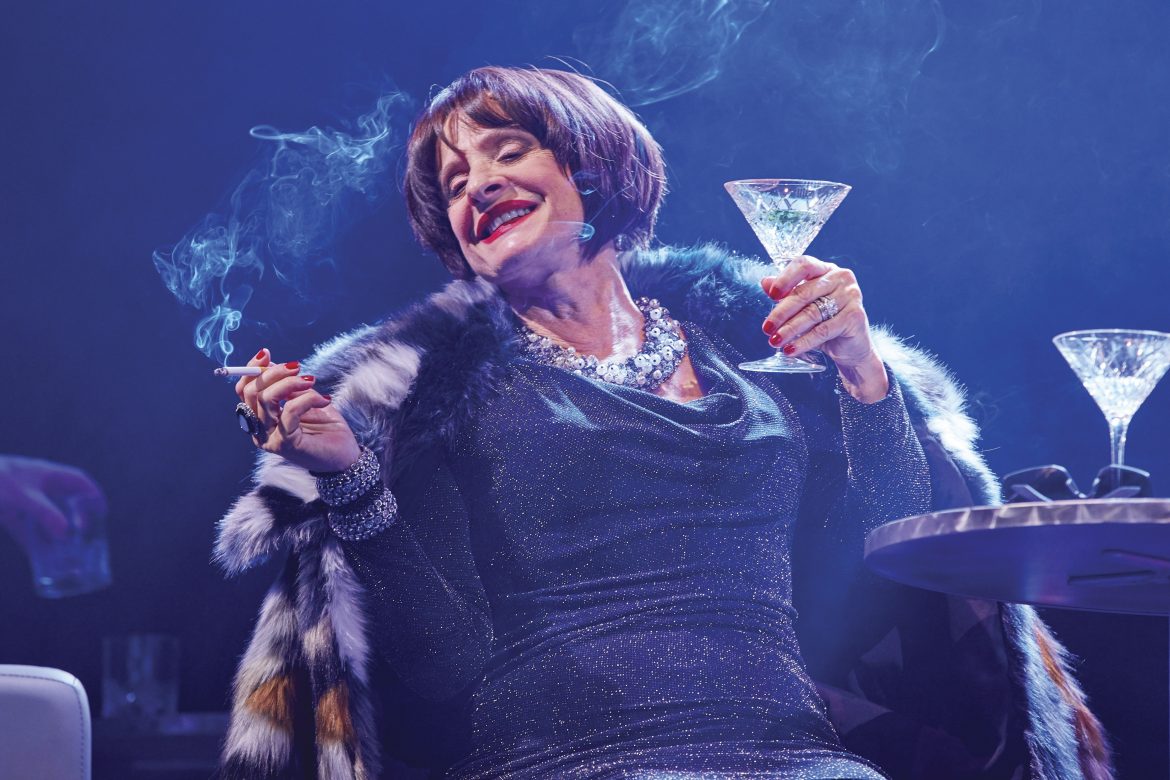She’s played a charismatic South American dictator, a tyrannical stage mother, a baker making pies of human remains, the queen of cosmetics, a faded silent screen diva, a happy-go-lucky night club singer, and a single mother forced into prostitution. Patti LuPone’s non-stop, five-decade career has spanned every conceivable medium: television, stage (musical and drama), opera, and recordings, in a range of roles very few actors have accomplished. Winning two Grammy Awards (Best Classical Album & Best Opera Recording: Weill: Rise and Fall of the City of Mahagonny, 2008); two Tony Awards (Best Actress in a Musical, Evita, 1980, and Gypsy, 2008); and two Olivier Awards (Best Actress in a Musical, Les Misérables, 1985, and Best Actress in a Supporting Role in a Musical, Company, 2019) LuPone’s talent has been justly rewarded.

Evita (photo by Martha Swope)
Part of the first graduating class of Juilliard’s drama department in 1972, along with Kevin Kline, her theatre career blossomed in the mid-1970s. Early on she showed off her versatility as a serious actress with her Broadway debut in Three Sisters, followed by her comedic and musical talent as Rosamunde in the musical The Robber Bridegroom, for which she was nominated for her first Tony Award.
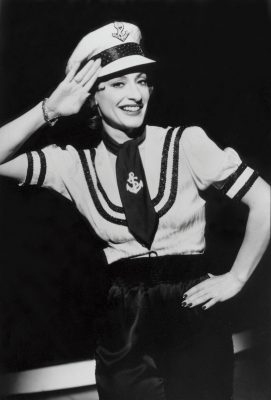
Anything Goes (Photo by Brigitte Lacombe)
Although LuPone said, “Evita was the worst experience of my life,” the 1979 musical made her a star. It was also one of the first Broadway shows to use television commercials, making LuPone a household name with her dominating presence as a blonde siren singing “Don’t Cry for Me Argentina.” Along with the fame of Evita, LuPone gained the title of a diva. “The word diva to me means doing something supernatural with something natural” is the way LuPone interprets “diva.”
In the 1980s, LuPone’s theatre career soared with plum roles in The Cradle Will Rock (New York and London productions), as Reno Sweeney in Anything Goes, and Fantine in the London production of Les Misérables. In 1988, LuPone married Matthew Johnston, a cameraman she met on the set of the television movie LBJ, in which she played Lady Bird Johnson.
In an almost 180 degree turn around, LuPone starred as a working, suburban mother in the television drama, Life Goes On, which successfully ran for four seasons on ABC from 1989-1993. The groundbreaking show was the first television series to feature an actor with Down syndrome.
In the ultimate diva role, LuPone starred as Norma Desmond in the musical Sunset Boulevard, which premiered in London in 1993. Real life created much more drama offstage than in the show when Andrew Lloyd Weber abruptly fired her and replaced her with Glenn Close, who went on to star in the Broadway production.
As part of the quirky, scaled-down, Broadway revival of Sweeney Todd in 2005, not only did LuPone play the role of Mrs. Lovett, she also played the tuba in the show, a hidden talent from her high school band years.
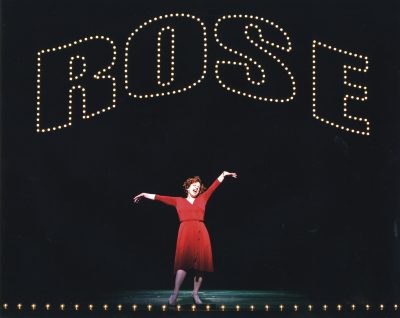
Gypsy (Photo by Joan Marcus)
Proving her fearless talent once again, LuPone more than pulled out all the stops as Mama Rose in a revival of Gypsy in 2009, bringing to the role a new intensity and depth not seen before, especially in the truly gut-wrenching rendition of “Rose’s Turn.” The role garnered LuPone every major acting award that year, including her second Tony.
In 2019, LuPone had a juicy role as a vengeful and vulgar landlord in another groundbreaking television series, Pose, created by Ryan Murphy, about the drag ball culture and trans-community in New York in the late 1980s and early 1990s.
Years ahead of her time, LuPone fearlessly portrayed strong-willed women who weren’t afraid to speak their minds, mirroring them in real life with her pull no punches opinions about life, show business, and politics.
Fresh off the sold-out London run of Company, for which she received an Olivier Award for Best Supporting Actress in a Musical, LuPone is set to return to Broadway playing the same role of Joanne in the Broadway revival. LuPone breathes new life into this iconic character, putting her unique stamp on the role of the boozy New York City housewife, as though we were seeing the character for the first time.
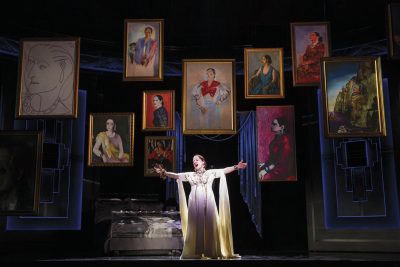
War Paint (Photo by Joan Marcus)
Who were your first entertainment idols, and what attracted you to them?
Bette Davis and Edith Piaf. They are still my role models. They were courageous. They led with open souls. They were not conventionally beautiful, and yet they were mesmerizing.
What came first to you, becoming an actor or a singer?
They go hand in hand. I couldn’t sing without acting the story of the song.
You were in the first graduating class of Julliard’s Drama Division and studied with John Houseman, which is pretty impressive. Who were some of your teachers, and which of them had a lasting impact on your career?
John Houseman was the artistic director along with Michel Saint-Denis of the Drama Division from the beginning. The teachers that most affected me were Jacques Lecoq, Anna Sokolow, and Marian Seldes.
Did winning the Tony Award for Evita open up your career in a big way? What roles and opportunities were you offered?
Winning the Tony did nothing for me. The only role I was offered was Lady M in Macbeth. I thought, “Haven’t I been playing her for the last two years?”
After playing women who were fighters and larger than life characters, what was the transition like playing a toned-down mother of two children in Life Goes On?
I found the writing of Libby Thatcher such a poor portrayal of contemporary working mothers. I wished it had not been the patriarchal environment that it was. It was actually quite boring.
You recently played a Leona Helmsley-like character in the series Pose. Was it fun playing that role? What was it like working with Ryan Murphy and cast of the show?
On Pose, I played a character loosely based on Leona Helmsley. I was so honored to be a part of the show, and I have such respect and admiration for those Warrior Goddesses. They are brave and beautiful. Billy Porter is so wonderful in it as well, and Ryan Murphy is a kind of savior because he brings into focus the disenfranchised and the minorities.
What was it like shifting from playing the leading lady to being in an ensemble cast in Company?
It did not take any adjustment. I’m a trained actor who has worked in ensembles my entire career. I believe the whole picture is more interesting.
Is there a role you would still like to play that you never have?
I don’t think that way. I’m just grateful and happy when roles do come my way.
What was the most difficult role to prepare for and then play? Which role was the most fun?
Evita was the most difficult role to prepare for and play. I couldn’t sing it. It took a long time to be able to walk onstage with confidence. Rosamund in The Robber Bridegroom was probably the most fun to play—a slapstick comedy.
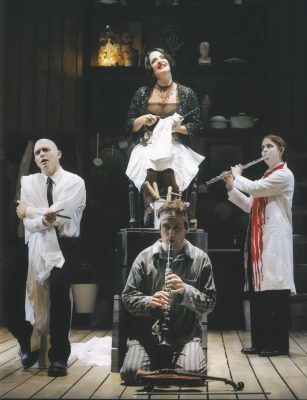
Sweeney Todd (Photo by Paul Kolnik)
Which character do you identify most with, or is most like you?
Every character I’ve played is an aspect of me.
You’ve had a long-time affinity with the gay community, and are also very vocal in the press about gay issues. Last July you tweeted a message to Lindsey Graham: “Lindsey Graham you are a disgrace. On a personal note, why don’t you just bite the bullet and come out. You might just come to your senses.”
What was the reaction, good and bad, and what was your purpose for posting it?
The reaction was mixed to the Lindsay Graham tweet. I tweeted it because he’s an idiot and because I think he’s closeted. If he were true to himself, he would be a much better human.
You’ve been vocal, both onstage and off, for your disdain for cell-phone use in theatres. What actions would you suggest producers take to encourage more attentive audience behavior? Do you think Actor’s Equity should get involved or make recommendations toward solutions beyond pre-show announcements?
Actors should not be responsible for policing those few people who eat, use their cell phones to text or film, or do anything that might disrupt the experience for the rest of the audience, but we are. I don’t know what else can be done. I just know I don’t want to have to stop a show.
With a career spanning more than 40 years in the theatre industry, you’ve worked with a range of directors. Who has created the most collaborative work environments for you to excel at your craft and how?
Marianne Elliott and Michael Greif are two of the most collaborative directors that I’ve ever worked with. I can’t tell you why. Perhaps they respect the actors they cast.
Has your sense of humor eased the difficult times in your career?
My humor has saved me from everything. There’s nothing like laughter, even in the most grim or tragic situations.


